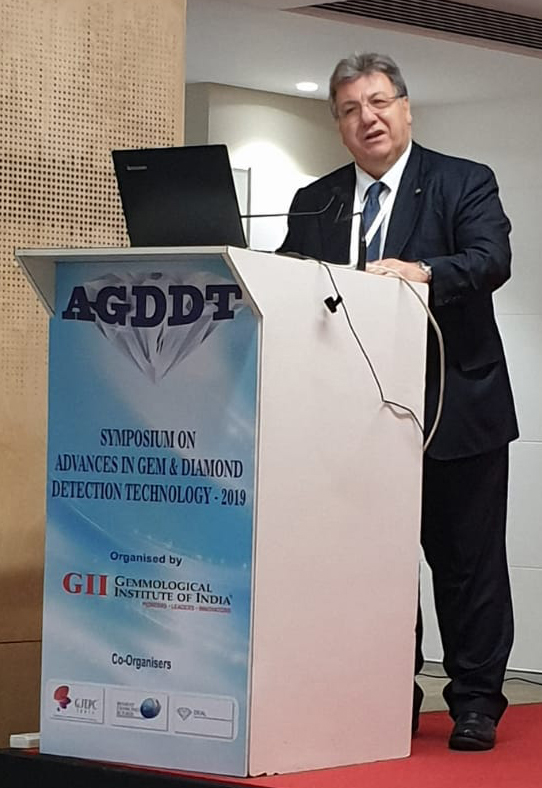Standards and due diligence tools being developed to enable all industry participants source responsibly

CIBJO President Gaetano Cavalieri addressing the 2019 Advances in Gem & Diamond Detection Technology (AGDDT) symposium in Mumbai, India, on August 7, 2019
AUGUST 12, 2019
All participants in the jewellery and gemstone value chain will need to come to terms with the fact that basic due diligence demonstrating that they are sourcing their supply responsibly is becoming is a regular requirement for doing business, said Gaetano Cavalieri, President of CIBJO, speaking last week in Mumbai. At the same time, he added, the systems being developed must be inclusive, meaning that they cannot discriminate against ethical players because of their size or financial capacity.
The CIBJO President was speaking on August 7, during the opening day of the 2019 Advances in Gem & Diamond Detection Technology (AGDDT) symposium, organised by the Gemmological Institute of India. The event at the Bombay Exhibition Centre preceded the opening of the India International Jewellery Show (IIJS), in which Dr. Cavalieri participated the following day. He also joined an AGDDT panel discussion looking at measures that should be taken by the industry to successfully absorb laboratory-grown diamonds into the product mix, without compromising the position of naturally sourced diamonds.
In his presentation on August 7, Dr. Cavalieri focused specifically on the predicament faced by the coloured gemstone sector, which is dominated by small and medium-sized enterprises at almost all stages of the chain of distribution. “In diamonds,” he stated, “close to 80 percent of the volume of rough goods are mined by only seven companies, and more than 90 percent in terms of value. In the coloured stone sector the situation is reversed. Artisanal and small-scale miners account for more than 80 percent of production, both in terms of volume and value.”
A basic premise of CIBJO’s Responsible Sourcing Blue Book, which was approved by the CIBJO Board of Directors early in 2019, he said, was that it would be a “protocol that could be universally accepted by larger and smaller enterprises, which would meet the ethical standards that our industry expects from itself, and at the same time is acceptable from the perspective of the international community.”
“An operating principle of the Responsible Sourcing document was that it would be inclusive, meaning that there is an expectation that the standards, guidelines and systems that it describes can reasonably be applied by all members of the industry, irrespective of size or financial capacity,”he stressed.
In his presenation, Dr. Cavalieri outlined how CIBJO is developing tools and other materials, in cooperation with industry players, which are designed to assist individuals, companies and organisations apply the principles contained in the CIBJO Responsible Sourcing Book, with a special emphasis on meeting the needs of small and medium-sized enterprises.
In April, during the OECD precious minerals forum in Paris, CIBJO signed an MOU with the Coloured Gemstone Working Group, which is a committee made up of representatives of Tiffany & Co., Swarovski, Richemont, Muzo Companies, LVMH, Kering, and Gemfields, facilitated by The Dragonfly Initiative. The goal is to produce an online suite of tools and resources that will be made available free of charge from an online platform, which essentially will enable companies to implement the principles outlined in the Responsible Sourcing Blue Book.
“We do not agree with those who contend that, only because of company’s size, it should be given a free pass when it comes to responsible sourcing,” Dr. Cavalieri said. “Just as there are basic standards of practice when it comes to grading and disclosure, which all members of our industry are obliged to maintain, the same is true with responsible sourcing. Everyone can do something, to the best of their ability.”
“Let us be honest with ourselves,” he continued. “The demand that we document where goods come from and where they are going is not unreasonable. Your governments expect each and every one of you to maintain orderly books and follow basic accounting practices. In other words, you are already doing due diligence in your businesses.”
